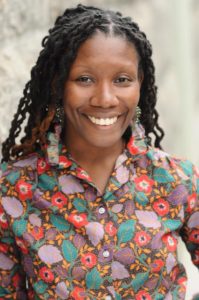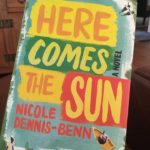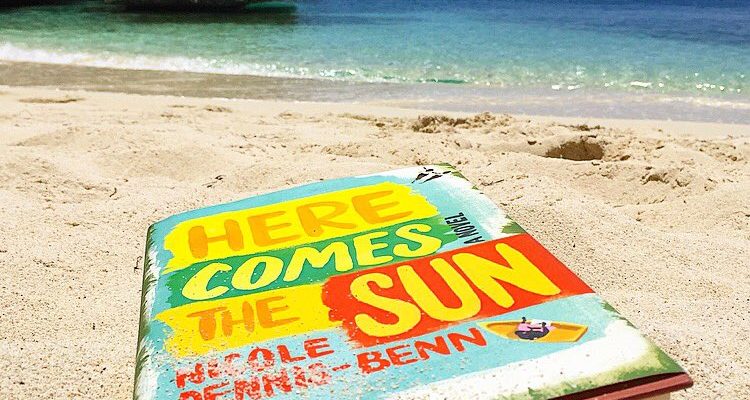Here Comes the Sun chronicles three generations of one family, focusing on three women: Margot, Thandi, and Delores. Set against the backdrop of the lush resorts and pristine beaches of Montego Bay in Jamaica, the story begins and ends with Margot. Margot is 30 years old, beautiful, poised and envied by the women on the island. In addition to working at the front desk of an upscale resort in Montego Bay, she is secretly sleeping with Alphonse, her white boss, while also serving as a courtesan to some of the hotel’s wealthiest patrons. Unlike other locals, who are also trying to eke out a living, Margot stands out as a character who immediately takes center stage. Every morning, Margot crosses from one world (her home in the sleepy town of River Bank) to her job at the posh resort in Montego Bay. And the persona that she must become works both for and against her:
All her life her presence has brought about pauses and silences louder than the white-hot sun and screaming crickets at the height of dusk…It’s strange how people always sense her. Before she approaches them, they look up and over their shoulders. It’s as though she brings a change of weather in her dove-gray suit amid the languorous ease of a dry, hot day…She also draws the attention of women carrying buckets of water on their heads, their mouths curved with malice and necks stiff with resentment.
The men holler, “Ey, beautiful,” but the women barely say hello and call her Miss High an’ Mighty. Dennis-Benn’s language is both sensuous and precise. And it’s the language that she uses that simultaneously empowers her characters and makes them so vulnerable. Readers will root for Margot and admire her grace and drive, her dignity amidst the hard life she must negotiate on a daily basis. Locals resent the strong-willed woman who must claim one persona in front of white tourists at the hotel and another back home—in her humble home, built on abandoned land, illegally wired with electricity that comes courtesy of a nearby light pole. A life spent hustling to help pay rent, feed her mother, her grandmother and her younger sister Thandi.
Margot yearns to leave the poverty of her home, and does everything she can so Thandi can avoid her fate. Their mother Delores, who sells tourist souvenirs, has had a hard life and has made some heartwrenching sacrifices—at the expense of her daughters—beginning with having taught her daughter to trade her sexuality for survival. In the midst of all of this is Margot’s love for Verdene, a lesbian whose house is regularly vandalized by homophobes. I won’t give any more details about the novel because I highly encourage readers to go out and get it, so without further adieu, Nicole Dennis-Benn.
Maribel Garcia: Your novel is an incisive social commentary on the intricacies of race, gender, wealth inequality, colorism, and tourism. Reviewers, when praising your book, have said something along the lines of the story is not “preachy” nor do these major themes overwhelm. White authors get to write about the intricacies of familial estrangement, poverty, love, and betrayal, but rarely are they accused of “preaching” or identity politics. Do you think that non-white authors will ever be treated as “universal” storytellers? Because right now, in the traditional publishing world does universality (universal themes) still equal whiteness?
Nicole Dennis-Benn: I understand it is human nature to constantly assess how something fits into our understanding of the world. In my opinion, regardless of a writer’s race, culture or background, a good story stands on its own when it depicts the human experience, which will resonate with a reader for various reasons. I write with this in mind, knowing that it may have been easy to dismiss Here Comes the Sun as a “Jamaican story” since it was written by a Jamaican author and set in Jamaica. People probably expect a book set in Jamaica to be about the things they know Jamaica to be—the Sandals ads they’ve seen, Bob Marley, the inclusive resorts they’ve stayed in, the nannies they hired. However, what I was writing against, and continue to write against, is the notion that stories can’t be universal because it’s written by a non-white female author. I’ve witnessed too many books get dismissed upon the realization that they were written by a person of color, or a woman, or a gay person, or an immigrant, or whatever marginalized group one could think of. Therefore, I was greatly honored by the fact that my reviewers declared my book as universal, and have declared me as not just a Jamaican writer, but a writer.
I understand it is human nature to constantly assess how something fits into our understanding of the world. In my opinion, regardless of a writer’s race, culture or background, a good story stands on its own when it depicts the human experience, which will resonate with a reader for various reasons. I write with this in mind, knowing that it may have been easy to dismiss Here Comes the Sun as a “Jamaican story” since it was written by a Jamaican author and set in Jamaica. People probably expect a book set in Jamaica to be about the things they know Jamaica to be—the Sandals ads they’ve seen, Bob Marley, the inclusive resorts they’ve stayed in, the nannies they hired. However, what I was writing against, and continue to write against, is the notion that stories can’t be universal because it’s written by a non-white female author. I’ve witnessed too many books get dismissed upon the realization that they were written by a person of color, or a woman, or a gay person, or an immigrant, or whatever marginalized group one could think of. Therefore, I was greatly honored by the fact that my reviewers declared my book as universal, and have declared me as not just a Jamaican writer, but a writer.
Nevertheless, I am aware that white male authors don’t have to worry about such things. However, I know that if I think too much about that, I would never write the stories I want to write. The best I can do is keep writing. People will realize for themselves what I’m about when they read my work. Audre Lorde once said, we dismiss each other in so many ways without realizing that we are in fact, similar. Hopefully, more readers can get access to the books of authors of color and realize just that.
MG: In your novel, an extended drought has robbed many residents of their livelihoods, and their homes are threatened by developers who want to build yet another huge resort, one where rich, white tourists can luxuriate, only miles away from the poor villages that surround it. Ultimately, so much of the tension that drives the characters and the plot has to do with this complicated interplay between both the advantages and disadvantages of the role of tourism. On the one hand, it creates jobs but, on the other, it pushes up local property prices and the cost of goods and services. Here Comes The Sun is an excellent example of how money generated by tourism does not always benefit the local community. Your current novel shows just how unequal the distribution of power is when it comes to tourism. In many cases, it even highlights the powerlessness of many local communities. Have you considered a sequel that shows readers what happens as people are displaced and resettled elsewhere?
NDB: No. No sequels. I think the book speaks for itself.
MG: One of the fascinating things about the novel was the many nuanced ways that blackness (and shades of blackness) mark women as sexualized objects. You have the white tourists eager to:
…satisfy a deep curiosity that he never had the balls to satiate with the women in his country. Like a black woman’s breasts, for instance.
Or the voice of Miss Ruby, River Bank’s unlicensed beautician, who convinces young women like Thandi that dangerous, chemical-ridden bleaching agents, like “Queen of Pearl crème,” will peel the blackness off and change their lives. This internalization of “white” as the ultimate beauty ideal has led to communities of people of color discriminating against each other. Alice Walker’s 1983 essay coined the term colorism to explain “prejudicial or preferential treatment of same-race people based solely on their color.” In the novel, you portray the effects that racism has on the self-image of black women via Thandi’s yearning to become lighter. Thandi’s story reminded me of Pecola in Toni Morrison’s The Bluest Eye. Thandi is coming of age in a society that is both racist and colorist and this kind of prejudice inevitably and insidiously affects the most vulnerable. How have younger readers reacted to Thandi’s story?
NDB: I think Thandi’s story was an important one to tell given that many working-class Jamaican boys and girls desire acceptance and access, some resorting to bleaching their skin to feel like they matter in a country grappling with its post-colonial scars. Many readers, young and old, identify with Thandi. Again, not solely on her lightening her skin, but her feelings as an outsider. The high school students, who I’ve had the pleasure of speaking with, have spoken up about their feelings of alienation. In Thandi’s character, they see that they aren’t alone. For no matter where we’re from, our age, or who we are, we have all dealt with those feelings of not feeling good enough, pretty enough, smart enough. Therefore, I find that my readers connect to this story in ways I could never have predicted. I found that this is a story about the things we do for acceptance, which speaks to many people—be it wearing lighter contact lenses, bleaching our skin, starving ourselves, wearing too much make-up, getting breast implants, relaxing our hair or wearing a weave, getting plastic surgery or gastric bypass surgery, and the myriads of ways in which we alter ourselves to be accepted.
MG: One of the things we learn at the beginning of the novel is that Margot is keeping a different kind of secret from her family, her sexuality. Margot is in love with Verdene Moore, an older, educated woman. In Jamaica, like in many other places, including the United States, this can get a person killed. In 2006, Time magazine called Jamaica “the most homophobic place on earth.” At the time, the country was experiencing excessive violence and hate crimes against gays and lesbians. It’s been a whole decade since that headline, and Jamaica has evolved in radical ways. One of the country’s most reputable newspapers, The Gleaner, published a groundbreaking editorial supporting LGBTQ communities and calling out the hypocrisy of anti-gay Christian fundamentalists who claim homosexuality is a “Western import.” More importantly, LGBTQ rights have been championed by some of the country’s most prominent leaders, like former Prime Minister Portia Simpson-Miller. Your novel, by making homophobia a central part of the storyline is one more voice that helps to dispels this global stereotype. How has your novel been received by people in the LGBTQ community?
NDB: The story is more complex than Margot’s sexuality. I think more than anything else, people realize that a story can be told with a gay narrative without it being a gay story. Yes, I think with any storyline or character, it’s about representation. But from what I’ve seen at readings, people have fallen in love with Verdene and Margot’s relationship because it’s a beautiful story that depicts love and loss—another universal theme.
MG: Margot and other women like her are exploited by rich white men who visit the island looking for poor women. What made you want to write about the role that sex tourism has on the many aspects of the gendered, classed, and racialized tourism industry?
NDB: I wouldn’t say that rich white men exploit locals for sex without saying that sex is also readily offered to them by sex-workers. Sex-work is a transaction that takes two. Just like in any business and in any country, be it first world or third world. Also, these men aren’t necessarily rich and white and men. Women are also clients, often hiring men with dreadlocks as lovers. Moreover, I wanted to humanize sex-workers though Margot’s character by showing that they are humans with limited opportunities, using the one thing they know that will supplement their financial needs. By default, race, class, and gender come into play given that the more marginalized a community, the fewer opportunities available to them. More than anything else, it’s about survival.
MG: You set the story in River Bank, a fictional town on the outskirts of Montego Bay, which is tourism central and wrote much of the dialogue in the patois of your homeland. Chicana author Gloria Anzaldua did something very similar in her book Borderlands/La Frontera: The New Mestiza. I remember reading Anzaldua’s variants of Chicano Spanish, a language which had always been deemed “incorrect” and not proper. She turned my language, the language of South Texas Chicanos into a living thing. For many readers, this new language (a mix of Mexican Spanish and American English) revealed what it was like to live in two cultures simultaneously. Have you had a similar reaction by your readers? Have readers familiar with the patois of Jamaica responded positively to this?
NDB: Many Jamaicans enjoy seeing and hearing themselves on the page. This is important to me to authentically capture and preserve our language. I remember reading Gloria Anzaldua in college, then later, Junot Diaz—both of whom unapologetically insert Spanish in their works without explanation. However, as a reader, their works have challenged me to slow down and pay close attention to the context. I walk away from their works with so much more when I challenge myself that way as a reader. It was Gloria Anzaldua who said “Until I am free to write bilingually and switch codes without always having to translate…and as long as I have to accommodate the English speakers rather than having them accommodate me, my tongue will be illegitimate.” I thought that was a powerful statement, especially for me as a writer who writes dialect. My characters are working class Jamaicans. Therefore, I wanted to stay true to them. That is how we speak to each other. Patois is our first language; English is our second language. We are discouraged to speak Patois in schools because it is deemed as uncultured. As a result, many Jamaicans grow weary of the very language our ancestors spoke, becoming ashamed of it, self-conscious when we break into it. Language is an essential part of identity; so to tell a group of people not to speak their language is the first step in annihilating our voice. We are socialized to loathe our language as much as we are socialized to loathe our African features and dark skin and hair. Such are the indelible scars of colonialism. I depicted this struggle in Thandi’s character. My Jamaican readers were able to see this struggle played out and appreciated that it was put into words, into context, which will help us unpack our internalized struggle as a people to preserve our language.
MG: Did the title of your novel have anything to do with George Harrison song “Here Comes the Sun” (1969)?
NDB: The title of the book certainly has nothing to do with the Beetles’ song! In my novel, the sun is symbolic—an irony in that we were raised to fear the sun as darker skin Jamaicans. In my book, it is that very same sun that becomes an illuminating factor, revealing the realities and ugliness of desperation inherent in poverty.
Nicole Dennis-Benn is the author of the highly acclaimed debut novel, HERE COMES THE SUN (Norton/Liveright, July 2016), a New York Times Notable Book of the Year and an Amazon and Kirkus Reviews Best Book of 2016. Dennis-Benn’s debut novel has received a starred Kirkus Review and is deemed one of the best books to read this summer and beyond by New York Times, NPR, BBC, BuzzFeed, Book Riot, Bookish, Miami Herald, Elle, O Magazine, Marie Claire, Entertainment Weekly, Flavorwire, After Ellen, BookPage, Cosmopolitan, Brooklyn Magazine, among others.
Buy her  book and feel free to check out her webpage.
book and feel free to check out her webpage.



Hello I find excellent article about games of thrones browser game